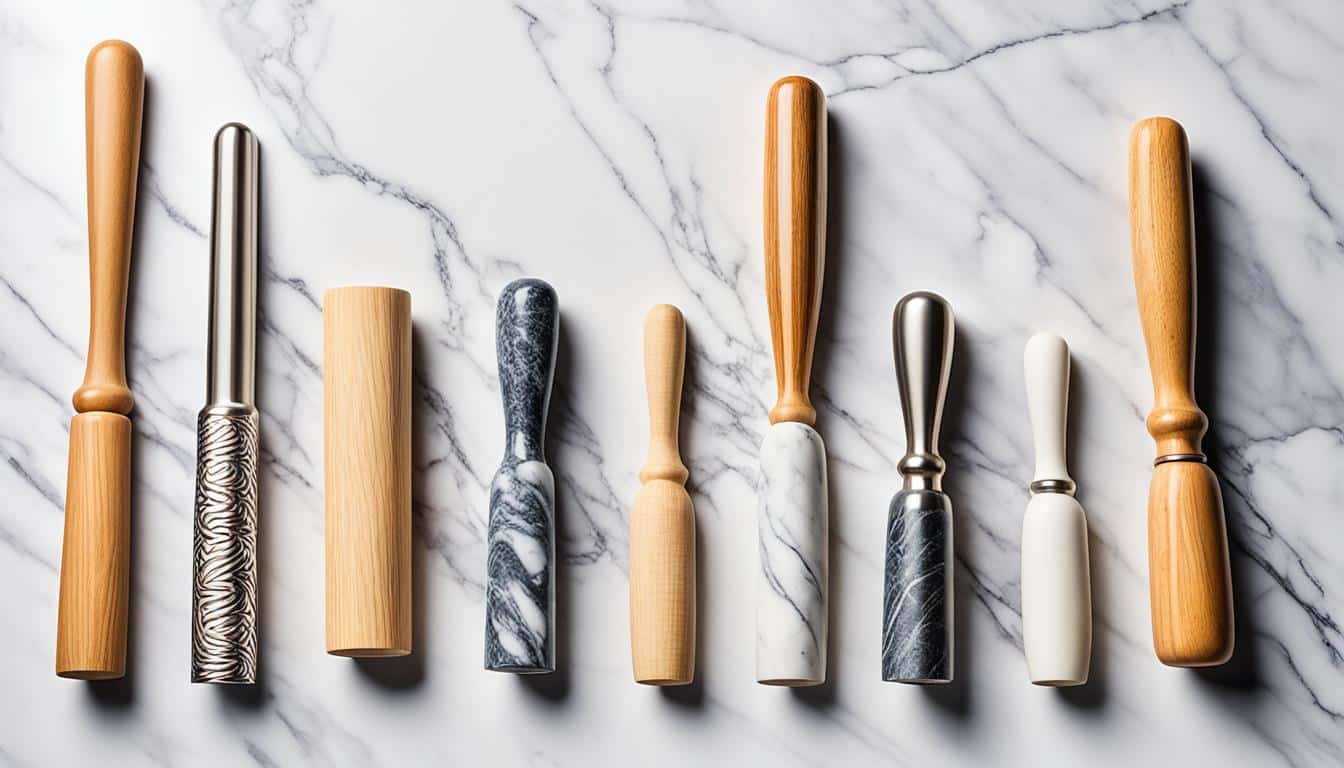Choosing the Perfect Rolling Pin for That Flawless Pie Crust
Have you ever spent hours preparing the perfect pie crust, only to have it turn out uneven and lumpy when it’s time to bake? We’ve all been there, and it can be frustrating to see our hard work go to waste.
But fear not, because we’re here to help you find the perfect rolling pin that will give you that flawless, professional-looking pie crust every time. With the right baking equipment, you can achieve the smooth, even dough thickness that will make your pies the talk of the town.
Now, let me tell you a little story. Picture this: It’s a crisp autumn morning, and the warm scent of freshly baked apple pie fills the kitchen. I’m standing at the counter, ready to roll out the dough for the pie crust. As I reach for my rolling pin, I can’t help but smile, because I know that this trusty tool will be the key to my culinary success.
The first thing I consider when choosing a rolling pin is the material. There are various options available, including wooden, marble, and more. Each material has its advantages, and it’s important to choose one that suits your preferences and baking needs.
Next, I look at the design of the rolling pin. Some prefer the sleek simplicity of a French rolling pin, while others opt for a regular rolling pin with handles for added maneuverability. Both styles have their merits, and it all comes down to personal preference and the type of dough manipulation you want to achieve.
Lastly, I consider the maintenance requirements. Some rolling pins require regular oiling to keep their smooth surface, while others can be simply wiped clean with a damp cloth. It’s important to choose a rolling pin that fits seamlessly into your baking routine.
So, whether you’re a seasoned baker or just starting out on your pie-making journey, choosing the perfect rolling pin is essential for that flawless pie crust. Stick around as we explore the different types of rolling pins and help you find the one that’s right for you.
Understanding the Distinction: French Rolling Pin vs. Regular Rolling Pin
When it comes to choosing a rolling pin for your baking needs, it’s important to understand the differences between a French rolling pin and a regular rolling pin. Each type offers its own advantages and considerations, which can impact your dough manipulation and overall baking experience.
French Rolling Pin
The French rolling pin is characterized by its sleek, solid wooden dowel without handles. This design allows for precise control and even thickness when rolling out dough. The lack of handles enables a seamless, uninterrupted rolling motion, resulting in beautifully shaped pastries. The French rolling pin is particularly favored by professional bakers and those who value fine craftsmanship.
Although the French rolling pin requires a bit more skill to manipulate, the results are worth it. Its simplicity and elegance make it a staple tool in French and European baking traditions.
Regular Rolling Pin
In contrast, a regular rolling pin typically features handles on both ends, offering extra maneuverability and ease of use. This design allows for a comfortable grip and more versatility when working with different shapes, sizes, and materials. If you prefer a rolling pin with handles or if you often work with larger quantities of dough, a regular rolling pin may be the better choice for you.
Whether you opt for a French rolling pin or a regular rolling pin, both can yield excellent results in your baking endeavors. Ultimately, your decision should be based on personal preference and the specific requirements of your recipes.
To help you better understand the differences, here’s a comparison table summarizing the key features of each type of rolling pin:
| French Rolling Pin | Regular Rolling Pin |
|---|---|
| Precise control and even thickness | Versatile with different shapes, sizes, and materials |
| Sleek, solid wooden dowel | Handles on both ends for added maneuverability |
| Requires skill and practice for optimal dough manipulation | Comfortable grip for easy rolling |
| Ideal for achieving a seamless rolling experience | Offers versatility and ease of use |
Remember, there is no right or wrong choice when it comes to selecting a rolling pin. It’s all about finding the tool that feels comfortable in your hands and suits your baking style. Experiment, have fun, and let your creativity roll!
Exploring Different Rolling Pin Styles: Wooden, Marble, and More
There are various styles of rolling pins to choose from, each with its own unique features and advantages. Whether you’re a professional baker or just starting in the kitchen, finding the right rolling pin can make a world of difference in your baking experience. In this section, we’ll explore three popular rolling pin styles: wooden rolling pins, marble rolling pins, and handled rolling pins.
Wooden Rolling Pins
Wooden rolling pins are a classic choice for many bakers. They are versatile, durable, and come in various shapes and sizes to suit different baking needs. The wooden material provides a sturdy and comfortable grip, making it easy to roll out dough evenly. With a wooden rolling pin, you have precise control over the thickness of your dough, whether it’s for cookies, pastries, or bread.
Marble Rolling Pins
Marble rolling pins offer a unique advantage in baking. The cool surface of marble helps keep the dough temperature low, which is especially important when working with delicate pastries or pie crusts. The weight of a marble rolling pin also aids in effortlessly rolling out dough, putting less pressure on your hands and wrists. It’s an elegant and efficient option that many baking enthusiasts swear by.
Handled Rolling Pins
Handled rolling pins are designed with convenience and control in mind. These rolling pins have handles on each side, allowing for a firmer grip and better maneuverability. They are particularly useful when working with larger batches of dough or when rolling out pizza crusts and other irregular shapes. The handles provide stability and precision, making the baking process more enjoyable and efficient.
When choosing a rolling pin, it’s important to consider your individual preferences and baking needs. Think about the type of dough you’ll be working with, the desired thickness, and your comfort level with different materials. Experimenting with different rolling pin styles can take your baking skills to the next level and help you achieve professional-looking results.
The Benefits of a French Tapered Rolling Pin: Why It’s Worth Considering
French tapered rolling pins are an essential tool for any baking enthusiast. Their unique design, made of wood, offers a seamless rolling experience and precise control over dough thickness. With tapered ends, these rolling pins allow you to effortlessly create perfectly even pie crusts and pastries every time.
One of the advantages of a French tapered rolling pin is its smooth surface, which reduces sticking and minimizes the need for excess flour. This means you’ll have less cleanup and a smoother rolling process. The wooden construction of these pins not only adds a touch of rustic charm to your baking routine but also provides a durable and sturdy tool that can withstand even the toughest doughs.
While French tapered rolling pins don’t have handles, their simplicity enhances maneuverability and makes them effortless to use. Moreover, with proper maintenance, like occasional oiling, these wooden rolling pins can last for generations, becoming cherished heirlooms that you can pass down to future baking enthusiasts in your family.
















Post Comment